Welcome to our Legal English Blog.
1. Learn Key Legal English Vocabulary and Terms
Explore essential Legal English vocabulary and see how these terms are used across areas like litigation, contracts, finance, AI and negotiation.
2. Enhance Your Legal English Skills
Discover tips and strategies for improving your Legal English skills and communication.
Our most recent posts:
- Common Legal English Phrases For Meetings
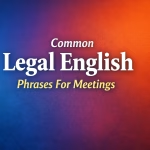
- How Lawyers Can Use Breathwork To Reduce Stress and Improve Clarity and Focus

- 25 Essential Contract Drafting Verbs Every Lawyer Should Know

- Legal English for Lawyers: 20 Real Phrases Lawyers Use to Talk About Their Cases

- How CEOs Are Talking About AI in the Workplace: 21 Key Terms Lawyers Should Know

- 27 Useful English Expressions for Lawyers in the Workplace

- Reduce Stress After Work With the Powerful Technique of One-Pointedness (Ekāgratā)

- Mastering Legal English: 8 Strategies for Non-Native English-Speaking Lawyers and Law Students
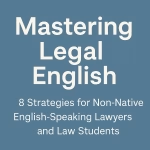
- Legal English Phrasal Verbs – Part 2: 10 More Key Expressions Every Lawyer Must Know
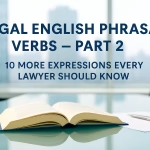
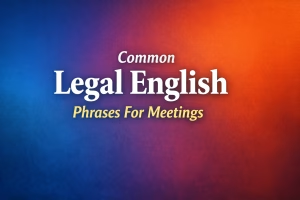 Legal English Vocabulary
Legal English Vocabulary Introduction Legal meetings are often fast-paced, informal in tone, and full of expressions that never appear in contracts or case law. For non-native English-speaking lawyers, these moments can be more challenging than drafting or research. The difficulty is not legal knowledge, but understanding the spoken Legal
 Focus & Productivity
Focus & Productivity Introduction: Breathwork Affects Clarity, Focus and Stress. Controlled breathwork from the yogic tradition, known as प्राणायाम (prāṇāyāma), is emerging as a powerful non pharmacological tool for professionals seeking enhanced clarity, sustained focus, and improved stress management. This post explores the potential cognitive and physiological benefits associated
 Legal English Vocabulary
Legal English Vocabulary Introduction: Contract drafting relies heavily on precise verbs, and choosing the right one can affect obligations, liability, and enforceability. These 25 verbs are some of the most widely used in commercial agreements. Each entry includes a clear definition and a sample clause so you can see
 Legal English Vocabulary
Legal English Vocabulary Introduction: This list of legal English phrases may seem somewhat random — and that’s because it is. These expressions come directly from real conversations with lawyers about their cases, clients, and court proceedings. Each one reflects how legal professionals actually speak in practice, not just how
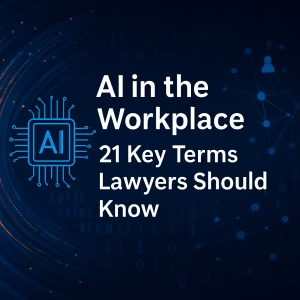 Artificial Intelligence Key Words
Artificial Intelligence Key Words Introduction: Artificial intelligence (AI) is transforming not only how businesses operate but also the language we use to describe work. As The Wall Street Journal recently reported, Walmart’s CEO Doug McMillon has warned that AI will “literally change every job.” This post breaks down 21 key
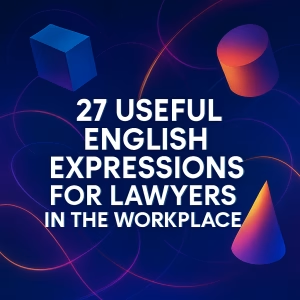 Everyday English for Lawyers
Everyday English for Lawyers Strengthen Your Communication Inside and Outside the Office with 27 Useful English Expressions for Lawyers in the Workplace Introduction For lawyers — especially those working with business teams or serving as in-house counsel — mastering everyday business English phrases is just as important as understanding legal
 Productivity
Productivity Reduce stress, restore calm, and gain clarity after a busy day with one-pointedness (ekāgratā) as described in Patanjali’s Yoga Sutras. 1. Key Takeaway Practicing ekāgratā — one-pointed focus on a single object like breath, music, or a hobby — helps calm the mind, reduce stress, and
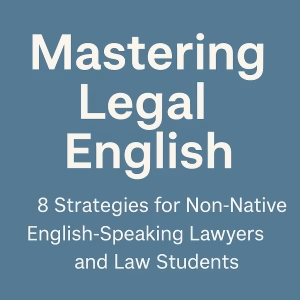 Legal English (General), Strategies to Master Legal English
Legal English (General), Strategies to Master Legal English Introduction. For lawyers and law students who speak English as a second language, developing fluency in Legal English is essential for success in today’s global legal environment. Whether you’re advising clients, negotiating agreements, preparing legal documents, or appearing in court, the ability to express yourself clearly,
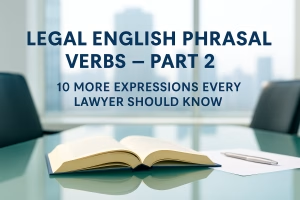 Phrasal Verbs
Phrasal Verbs Introduction. Legal professionals use phrasal verbs every day—often without even realizing it. Whether you’re drafting documents or negotiating terms, understanding these expressions can improve your fluency and confidence. Here are 10 more essential Legal English phrasal verbs to add to your toolkit. 10 More Phrasal Verbs
 8 Part Litigation Series, Legal English Vocabulary, Litigation Vocabulary
8 Part Litigation Series, Legal English Vocabulary, Litigation Vocabulary Introduction To Legal English for Appeals and Enforcement. The litigation process doesn’t always end with judgment. For many clients, the most critical work begins with an appeal or the challenge of enforcing a judgment. This final stage requires a new set of Legal English skills—focused on
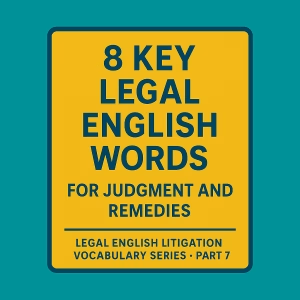 8 Part Litigation Series, Legal English (General), Litigation Vocabulary
8 Part Litigation Series, Legal English (General), Litigation Vocabulary Introduction To Judgment & Remedies. When a trial concludes, the court enters its decision—and the consequences become real. Whether seeking financial compensation, injunctive relief, or a final declaration of rights, attorneys must be fluent in the specialized Legal English used to discuss judgment and remedies. This
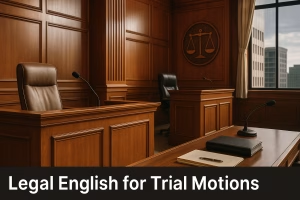 8 Part Litigation Series, Legal English Vocabulary, Litigation Vocabulary
8 Part Litigation Series, Legal English Vocabulary, Litigation Vocabulary Introduction To The Trial Stage. The trial is the culmination of months—or years—of litigation strategy. At this stage, clarity in courtroom communication is paramount. Whether addressing the judge, persuading a jury, or objecting to testimony, precise use of Legal English vocabulary for trial can influence the
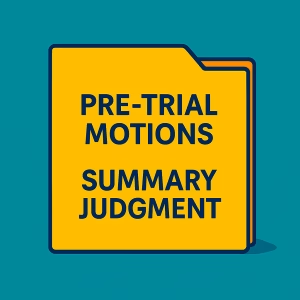 8 Part Litigation Series
8 Part Litigation Series Introduction To Pre-Trial Motions and Summary Judgment. As litigation approaches trial, pre-trial motions become a central strategic tool. This phase is about shaping what the judge or jury will hear, what evidence will be admitted, and even whether a trial is necessary at all. For attorneys—especially
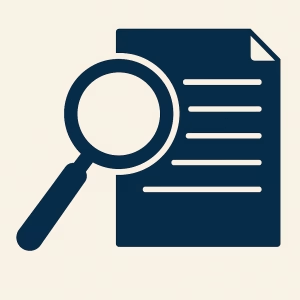 8 Part Litigation Series, Litigation Vocabulary
8 Part Litigation Series, Litigation Vocabulary Introduction To The Discovery Phase. The discovery phase is often the longest and most complex part of litigation. It is the stage where both parties exchange information, investigate facts, and gather evidence that will shape their legal strategies. Mastery of the litigation vocabulary language used during
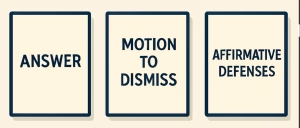 8 Part Litigation Series, Litigation Vocabulary
8 Part Litigation Series, Litigation Vocabulary Introduction: Defenses & Responsive Pleadings After a lawsuit is filed, the defendant’s response becomes the first major pivot point in the litigation. This stage introduces critical tools that may limit, delay, or even extinguish the plaintiff’s claims—before the case reaches discovery or trial. Lawyers must not
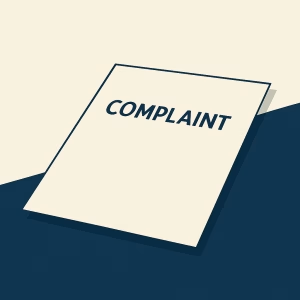 8 Part Litigation Series
8 Part Litigation Series Introduction Filing a lawsuit formally initiates a legal dispute and sets in motion the procedural and substantive mechanisms of civil litigation. For lawyers—especially international attorneys practicing or transacting with U.S. clients—mastery of the legal English litigation vocabulary used at this stage is essential. Drafting a complaint,
 8 Part Litigation Series
8 Part Litigation Series Introduction Litigation doesn’t begin in the courtroom—it often starts long before a complaint is filed. The pre-litigation stage is a critical phase in which lawyers communicate through letters, notices, and negotiations to resolve disputes or lay the groundwork for formal legal action. For lawyers and law
Whether you’re drafting a contract, negotiating a deal, or advising clients across borders, here are 10 essential Legal English terms you should know—and know how to use correctly. 1. Indemnify To compensate for harm or loss. Often used in contract clauses related to liability. Example: “The
In this post, we’ll break down 17 key vocabulary words for mergers and acquisitions (M&A). These words will help you discuss important concepts surrounding M&A. 1. Merger A merger occurs when two companies agree to combine their operations and form a new, unified business entity. Mergers
Understanding 12 Key Trademarks Terms. Trademarks play a crucial role in protecting brands and maintaining the identity of businesses in a competitive marketplace. Understanding the key terms and vocabulary associated with trademarks is essential for anyone involved in branding, business, or law. This post will break
20 Essential Expressions for Lawyers. Phrasal verbs are a key part of English communication, and lawyers often rely on them in both formal and informal legal contexts. Whether you’re in a courtroom, negotiating a deal, or working through case procedures, understanding these phrases can enhance your
Navigating the world of venture capital (VC) can feel like learning a new language. Whether you are a startup founder seeking funding or simply curious about the VC space, understanding the key terms is essential to making informed decisions. Below is a glossary of 22 fundamental
(Confabulation) – (AI Red-Teaming) – (Provenance Data Tracking) – (Cascading Impacts) – (Custom Co-Pilots) – (Content Window) – (Homogenization). (Confabulation) Confabulation refers to the phenomenon where a machine generates false information to fill in gaps in its memory or understanding, often without intention or awareness. (AI
(Dan “Do Anything Now”) – (Jailbreak) – (Safety Guardrail) – (AI-Boyfriend) – (Prompt Engineering) – (AI Whispering) – (Persona Prompt) – (New-Information Prompt) – (Question-Refinement Prompt). (Dan “Do Anything Now”) Dan is shorthand for “Do Anything Now,” representing an attempt to jailbreak the AI by coaxing
(Throttle the Creation) – (Regurgitate Training Data) – (Open Source AI) – (Biden’s Executive Order) – (Every Position is being redesigned leveraging AI) – (Sexting with AI) – (Fine Tuning) – (Anti-Woke AI) – (Artificial Intelligence Act) – (Guardrails and Pitfalls) – (Counterbalance) – (Biased AI)
The Supreme Court, applying the presumption against extraterritoriality, clarified that the Lanham Act provisions in question do not have extraterritorial reach.